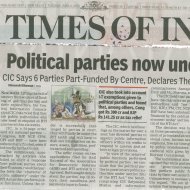
NEW DELHI: Lifting the cloak of secrecy from sources of funding of political parties and their expenditure the central information commission (CIC) has ruled that they are public authorities who now need to respond to RTI queries within six weeks.
Political parties on Monday lost the battle to stay out of RTI purview and keep their donors secret after the commission in a 54-page order said six national parties — Congress, BJP, NCP, CPI-M, CPI and BSP — have been substantially funded, even if indirectly, by the central government.
The CIC ruled political parties have the "character of public authority" under the RTI Act as they perform public functions on being approached by activists who failed to get a response from parties on who their top 10 donors were.
Unless the order is challenged successfully by political parties in court, it will mean parties are finally under the RTI Act and have to dish out information on donors, assets, liabilities, profits earned and spending.
The order comes on two applications filed by Association for Democratic Reforms (ADR) and RTI activist S C Agrawal.
CIC has directed parties to appoint public information officers within six weeks to respond to RTI queries and adhere to legal provisions.
"In view of the nature of public functions performed by political parties...we conclude that political parties in question are public authorities under section 2(h) of the RTI Act," the Bench, comprising Chief Information Commissioner Satyanand Mishra and Information Commissioners Annapurna Dixit and M L Sharma, said.
The commission held political parties have the character as public authorities and "we hold INC, BJP, CPIM, CPI, NCP and BSP have been substantially financed by the central government under section 2(h)(ii) of the RTI Act".
There were three parameters — allotment of prime land at concessional rates, income tax exemptions, free air time given by public broadcaster and electoral rolls given by the Election Commission — behind the decision.
The commission also recognized that while political parties are not "government owned'', they perform public functions by their own accord and transparency is necessary in this regard.
"We are of the opinion that bringing the political parties in the ambit of RTI Act is likely to usher an era of transparency in their functioning. Besides, it would result in strengthening of democracy and democratize institutions in the country," the commission said.
ADR's Anil Bairwal and Agrawal had sought information on the top 10 donors of political parties, their manifestos and payments to the party funds.
Not getting any response, they had approached the CIC seeking declaration of political parties as public authorities under the RTI. The commission held hearings over one year where all political parties except for CPI opposed the move to bring the parties within the ambit of the transparency Act.
The commission based its decision on three important points raised by complainants — substantial funding received by the parties from government, performance of public duty by them and legal provisions vesting them with rights and liabilities.
The commission also took into account I-T exemptions given to political parties and found that during last three years BJP got Rs 141.25 crore, Congress (Rs 300.92 crore), BSP (Rs 39.84 crore), CPM (Rs 18.13 crore), CPI (Rs 24 lakh) and NCP (Rs 9.64 crore) as tax relief.

